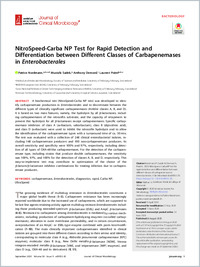NitroSpeed-carba NP test for rapid detection and differentiation between different classes of carbapenemases in Enterobacterales
- Nordmann, Patrice Medical and Molecular Microbiology, Faculty of Science and Medicine, University of Fribourg, Fribourg, Switzerland - INSERM European Unit (IAME), University of Fribourg, Fribourg, Switzerland - Swiss National Reference Center for Emerging Antibiotic Resistance (NARA), University of Fribourg, Fribourg, Switzerland - Institute for Microbiology, University of Lausanne and University Hospital Centre, Lausanne, Switzerland
- Sadek, Mustafa Medical and Molecular Microbiology, Faculty of Science and Medicine, University of Fribourg, Fribourg, Switzerland
- Demord, Anthony Swiss National Reference Center for Emerging Antibiotic Resistance (NARA), University of Fribourg, Fribourg, Switzerland
- Poirel, Laurent Medical and Molecular Microbiology, Faculty of Science and Medicine, University of Fribourg, Fribourg, Switzerland - INSERM European Unit (IAME), University of Fribourg, Fribourg, Switzerland - Swiss National Reference Center for Emerging Antibiotic Resistance (NARA), University of Fribourg, Fribourg, Switzerland
-
2020
Published in:
- Journal of Clinical Microbiology. - 2020, vol. 58, no. 9, p. 10.1128/jcm.00932-20
English
A biochemical test (NitroSpeed-Carba NP test) was developed to identify carbapenemase production in Enterobacterales and to discriminate between the different types of clinically significant carbapenemases (Ambler classes A, B, and D). It is based on two main features, namely, the hydrolysis by all β-lactamases, including carbapenemases of the nitrocefin substrate, and the capacity of ertapenem to prevent this hydrolysis for all β-lactamases except carbapenemases. Specific carbapenemase inhibitors of class A (avibactam, vaborbactam), class B (dipicolinic acid), and class D (avibactam) were used to inhibit the nitrocefin hydrolysis and to allow the identification of the carbapenemase types with a turnaround time of ca. 30 min. The test was evaluated with a collection of 248 clinical enterobacterial isolates, including 148 carbapenemase producers and 100 non-carbapenemase producers. Its overall sensitivity and specificity were 100% and 97%, respectively, including detection of all types of OXA-48-like carbapenemases. For the detection of the carbapenemase type, including strains that produce double carbapenemases, the sensitivity was 100%, 97%, and 100% for the detection of classes A, B, and D, respectively. This easy-to- implement test may contribute to optimization of the choice of the β-lactam/β- lactamase inhibitor combinations for treating infection due to carbapenemase producers.
- Faculty
- Faculté des sciences et de médecine
- Department
- Médecine 3ème année
- Language
-
- English
- Classification
- Biological sciences
- License
- License undefined
- Identifiers
-
- RERO DOC 329636
- DOI 10.1128/JCM.00932-20
- Persistent URL
- https://folia.unifr.ch/unifr/documents/309039
Statistics
Document views: 63
File downloads:
- nor_nct.pdf: 271
